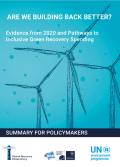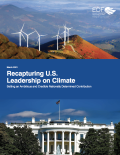
COVID-19 has led to a global crisis threatening the lives and livelihoods of the most vulnerable by increasing poverty, exacerbating inequalities, and damaging long-term economic growth prospects. This report provides an analysis of over 3,500 fiscal policies announced by leading economies in 2020 and calls for governments to invest more sustainably and tackle inequalities as they stimulate growth in the wake of the devastation wrought by the pandemic.
The analysis shows that the impacts of environmental degradation tends to be concentrated among vulnerable groups and households. At the same, the benefits and costs of environmental policies are also likely to be unevenly distributed across households.
The purpose of this report is to provide development practitioners and government officials with an understanding of the context and key design features of climate budget tagging initiatives. It is based on a review of 18 climate budgeting tagging methodologies as well as key informant interviews with practitioners during 2020.
The Government of Antigua and Barbuda proposed a target of achieving 100 percent of its energy generation from renewable energy sources by 2030. Subsequently, this renewable energy roadmap for Antigua and Barbuda has been developed by the International Renewable Energy Agency (IRENA) at the request of the Ministry of Health, Wellness and the Environment.

This report demonstrates how achieving at least 50 percent emissions reductions is achievable – and that charting an ambitious path on climate is vital for growing a stronger and more equitable, clean U.S. economy.
